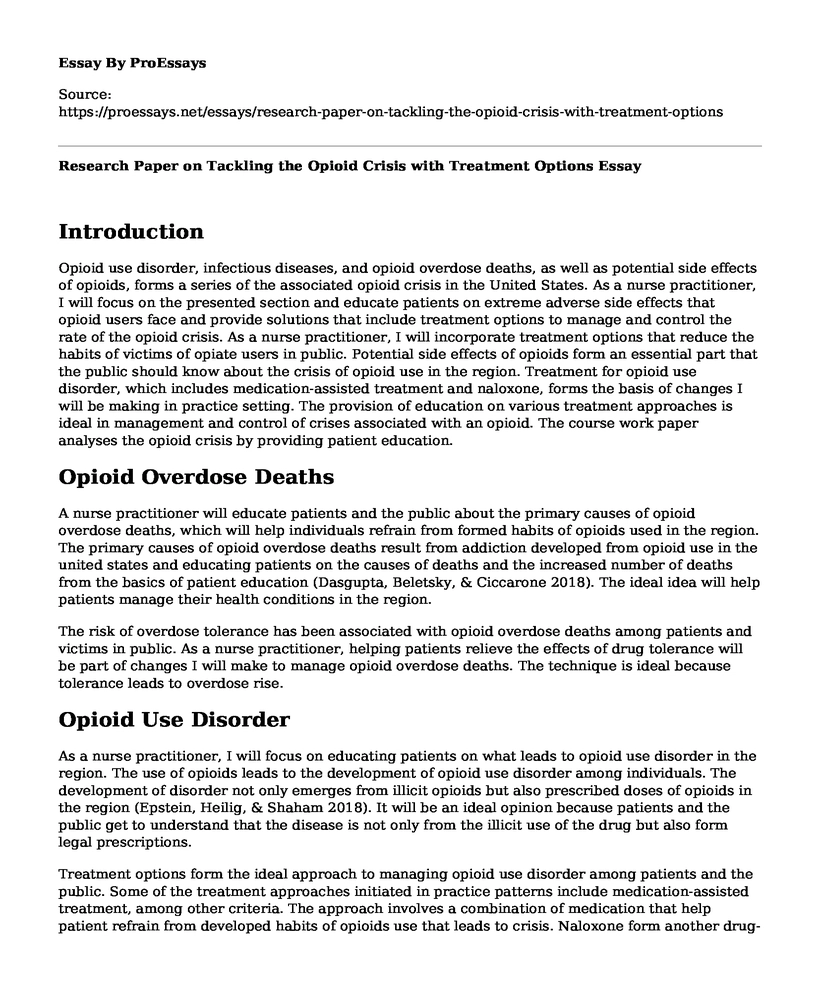Introduction
Opioid use disorder, infectious diseases, and opioid overdose deaths, as well as potential side effects of opioids, forms a series of the associated opioid crisis in the United States. As a nurse practitioner, I will focus on the presented section and educate patients on extreme adverse side effects that opioid users face and provide solutions that include treatment options to manage and control the rate of the opioid crisis. As a nurse practitioner, I will incorporate treatment options that reduce the habits of victims of opiate users in public. Potential side effects of opioids form an essential part that the public should know about the crisis of opioid use in the region. Treatment for opioid use disorder, which includes medication-assisted treatment and naloxone, forms the basis of changes I will be making in practice setting. The provision of education on various treatment approaches is ideal in management and control of crises associated with an opioid. The course work paper analyses the opioid crisis by providing patient education.
Opioid Overdose Deaths
A nurse practitioner will educate patients and the public about the primary causes of opioid overdose deaths, which will help individuals refrain from formed habits of opioids used in the region. The primary causes of opioid overdose deaths result from addiction developed from opioid use in the united states and educating patients on the causes of deaths and the increased number of deaths from the basics of patient education (Dasgupta, Beletsky, & Ciccarone 2018). The ideal idea will help patients manage their health conditions in the region.
The risk of overdose tolerance has been associated with opioid overdose deaths among patients and victims in public. As a nurse practitioner, helping patients relieve the effects of drug tolerance will be part of changes I will make to manage opioid overdose deaths. The technique is ideal because tolerance leads to overdose rise.
Opioid Use Disorder
As a nurse practitioner, I will focus on educating patients on what leads to opioid use disorder in the region. The use of opioids leads to the development of opioid use disorder among individuals. The development of disorder not only emerges from illicit opioids but also prescribed doses of opioids in the region (Epstein, Heilig, & Shaham 2018). It will be an ideal opinion because patients and the public get to understand that the disease is not only from the illicit use of the drug but also form legal prescriptions.
Treatment options form the ideal approach to managing opioid use disorder among patients and the public. Some of the treatment approaches initiated in practice patterns include medication-assisted treatment, among other criteria. The approach involves a combination of medication that help patient refrain from developed habits of opioids use that leads to crisis. Naloxone form another drug-approach that I will incorporate in practice settings to manage a crisis that develops from opioid abuse. The medication is an antagonist of opioids that is effective in the treatment of opioid use disorder in the region. Methadone and naltrexone form a series of drugs to be incorporated in practice settings, which help manage the condition of the developed disorder.
Counseling and Behavioral Therapies
Counseling and behavioral therapies again from basic approaches I will be incorporating in practice setting, which is ideal in preventing and managing crises associated with opioid use among patients and public victims. Counseling is the ideal approach that seeks to unveil reasons why patients use opioids, thus provide an excellent method effective in management and control of opioid crisis that results from the misuse of the drug.
Conclusion
To sum up, opioid overdose disorder results from opioid use. The development of the condition comes from both illicit purposes of an opioid and prescribed form of the drug. Treatment options form ideal approaches I will incorporate practice setting.
References
Dasgupta, N., Beletsky, L., & Ciccarone, D. (2018). Opioid crisis: no easy fix to its social and economic determinants. American journal of public health, 108(2), 182-186. https://www.ncbi.nlm.nih.gov/pmc/articles/PMC5846593/
Epstein, D. H., Heilig, M., & Shaham, Y. (2018). Science-based actions can help address the opioid crisis. Trends in pharmacological sciences, 39(11), 911-916. https://www.ncbi.nlm.nih.gov/pubmed/30343726
Cite this page
Research Paper on Tackling the Opioid Crisis with Treatment Options. (2023, Mar 12). Retrieved from https://proessays.net/essays/research-paper-on-tackling-the-opioid-crisis-with-treatment-options
If you are the original author of this essay and no longer wish to have it published on the ProEssays website, please click below to request its removal:
- Paper Example on Health Information Technology
- Using Health Information Technology as a Source of Evidence-Based Practice
- Reengineering Health Care Essay
- The Impact of Technology in Nursing Essay Example
- Research Paper on Arthritis: OA & RA - Causes, Symptoms, & Treatment
- Essay Example on Gut Bacteria and Diabetes: Examining the Link
- Jonathan Lee, Experienced DNP, APRN & Medical Director of Primary Care Practice - Report Example







